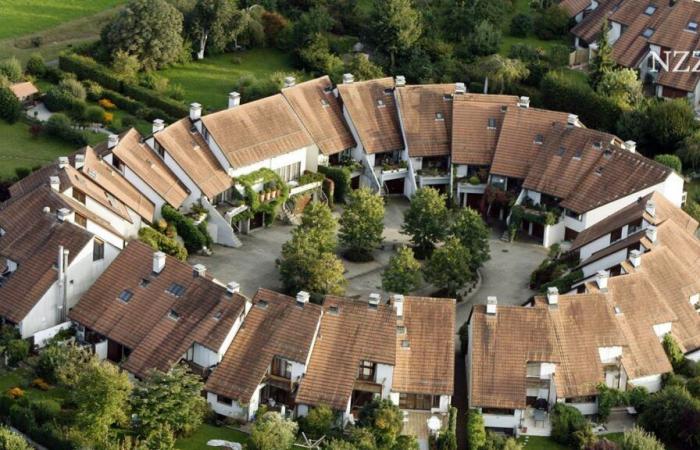The cantons want to at least maintain taxation of the imputed rental value for second homes. In the end, however, only a complete system change was up for debate in parliament.
Homeowners will continue to have to pay tax on the imputed rental value.
Steffen Schmidt / Keystone
In principle, taxation of the imputed rental value should be eliminated: the majorities of both chambers of parliament have long agreed on this. But the big question was whether there was agreement on a concrete reform proposal. Because every suggestion brings not only the hoped-for advantages but also new disadvantages.
NZZ.ch requires JavaScript for important functions. Your browser or ad blocker is currently preventing this.
Please adjust the settings.
In the parliamentary debate, two core differences emerged between the two chambers. The Council of States wanted to abolish the imputed rental value only for first properties so that the tourism cantons with their many holiday apartments do not suffer too large a loss. The National Council, however, wanted abolition for all properties. Different treatment of first and second properties opens up new ways of tax optimization, is considered administratively complex and constitutionally questionable. To appease the tourism cantons, the National Council proposed an amendment to the federal constitution – in favor of giving the cantons the authority to levy a special tax on second properties. But this has not significantly reduced the resistance of the tourism cantons.
The second sticking point was the general debt interest deduction. According to current law, interest on debts can be deducted from direct federal tax up to the total taxable investment income plus 50,000 francs. The Council of States wanted to reduce the maximum to 70 percent of taxable investment income; the National Council proposed a significantly greater reduction.
According to the National Council model, the maximum debt interest deduction depends on the share of rented properties in total assets. For example, if the taxpayer has gross assets of 5 million francs, of which 3 million are attributable to rented properties, he could deduct 60 percent of his debt interest. If you don’t have any rented properties, you wouldn’t be able to deduct any interest on debts.
This Wednesday, the two chambers of parliament could only say yes or no to the last remaining reform variant. This corresponded to the National Council’s model – with a complete change of system and a deduction of interest on debts, which depends on the share of rented properties in total assets. Because this variant prevailed on Tuesday in the unification conference of the two chambers of parliament.
Approval despite widespread skepticism
A yes from the National Council was to be expected from the outset, as its variant had prevailed. But would the Council of States accept this option? The answer came at 10 a.m.: The reform proposal passed with 22 yes to 15 no and 6 abstentions. This means the reform project stays alive. The National Council will also comment on this on Wednesday. His consent should only be a formality.
But there are still further hurdles for the reform package. On the one hand, this is the final vote on Friday in both councils. In view of the widespread skepticism, this final vote in the Council of States is likely to be more than just a formality.
In addition, the reform is legally linked to the discussed change to the federal constitution in favor of cantonal authority for a special tax on second properties. The Council of States will deal with this dossier on Thursday. Most recently, the Council of States spoke out against the new constitutional basis. But given the logic of Wednesday’s decision, the Council of States would in principle also have to say yes to the constitutional basis on Thursday. But the same applies here: Some of the councilors who voted in favor on Wednesday have serious doubts.
And if Parliament passes the overall reform on Friday, there will still be a referendum. Because of the planned constitutional change, the people and classes would be able to express themselves anyway. Going to the polls is likely to be a high hurdle given the lukewarm response from supporters and relatively broad opposition. The opponents include the cantons, some leftists including the tenants’ association and also the construction sector. The construction industry is not happy because the abolition of imputed rental value taxation would also eliminate the tax deduction for property maintenance costs.






